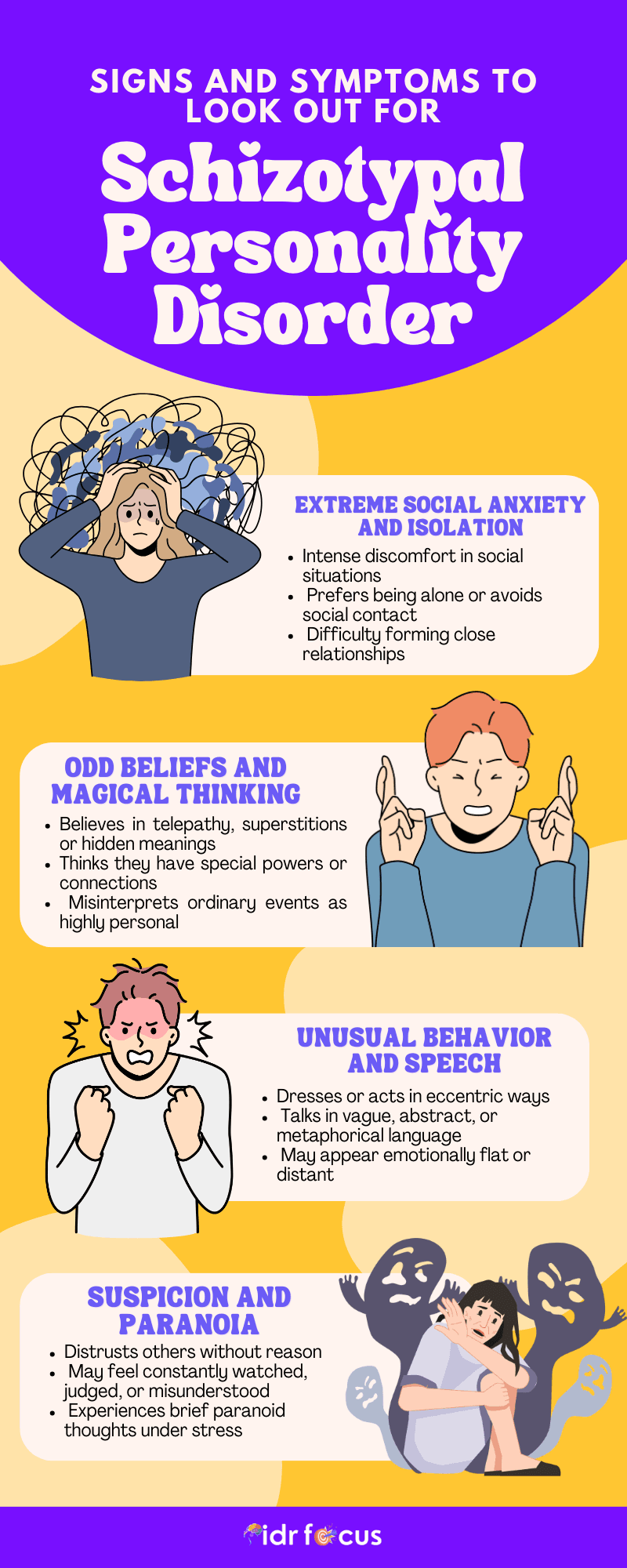Have you ever met someone who seems distant, overly anxious in social situations, or believes in things that sound unusual to others? Some people quickly label them as “weird” or “eccentric.” But what if there’s a deeper explanation? One that goes beyond shyness or personal preference?
Let’s talk about Schizotypal Personality Disorder (STPD)—often misunderstood, and sometimes unfairly called the “loner” disorder.
What is Schizotypal Personality Disorder?
Schizotypal Personality Disorder is a mental health condition where a person has unusual thoughts, behaves in odd ways, and struggles with social relationships. While it shares some traits with schizophrenia, it’s not the same. People with STPD are often aware of reality but may have magical thinking, odd beliefs, or intense social anxiety.
4 Major Signs and Symptoms to Look Out For
Extreme Social Anxiety and Isolation
- Intense discomfort in social situations
- Prefers being alone or avoids social contact
- Difficulty forming close relationships
Odd Beliefs and Magical Thinking
- Believes in telepathy, superstitions, or hidden meanings
- Thinks they have special powers or connections
- Misinterprets ordinary events as highly personal
Unusual Behavior and Speech
- Dresses or acts in eccentric ways
- Talks in vague, abstract, or metaphorical language
- May appear emotionally flat or distant
Suspicion and Paranoia
- Distrusts others without reason
- May feel constantly watched, judged, or misunderstood
- Experiences brief paranoid thoughts under stress

These symptoms usually start in early adulthood and may affect a person’s work, relationships, and everyday life.
Why It’s Not Just Shyness
It’s easy to confuse STPD with being shy or introverted. But STPD is more complex. While introverts may enjoy alone time, they can still form close relationships and understand social cues. People with STPD may want close connections but find them too overwhelming or confusing to manage.
They might also believe that random events have special meaning meant just for them, or that they have hidden powers—something that sets STPD apart from simple social awkwardness.
What Causes Schizotypal Personality Disorder?
The exact cause is still unknown, but experts believe it’s a mix of:
- Genetics: People with a family history of schizophrenia or similar conditions may have a higher risk
- Childhood trauma: Neglect or abuse in early life can increase the chances of developing STPD
- Brain chemistry: Imbalances in brain chemicals like dopamine may play a role
It’s important to remember: this isn’t the person’s fault. Like any mental health condition, STPD is a medical issue that deserves care and understanding.
How Is It Diagnosed?
A mental health professional, such as a psychologist or psychiatrist, will usually ask detailed questions about your thoughts, emotions, and behaviors. They’ll want to know how these symptoms affect your daily life.
They may also look at your medical and family history to rule out other conditions, like schizophrenia or anxiety disorders.
Treatment Options for Schizotypal Personality Disorder
While STPD can be challenging, treatment can help improve symptoms and daily functioning. Options include:
- Talk therapy (psychotherapy): A trusted therapist can help you understand your thoughts and improve your social skills
- Cognitive Behavioral Therapy (CBT): Helps challenge odd beliefs and reduce anxiety
- Medication: In some cases, antipsychotic or antidepressant drugs may be prescribed to manage intense symptoms
- Social skills training: Practicing real-life social situations with support can boost confidence
Recovery is not about “fixing” someone—it’s about helping them live better, more connected lives.
Why It’s Important to Spread Awareness
People with STPD are often misunderstood. They may be called “weird,” “creepy,” or “off”—when in reality, they’re struggling silently with deep fears and loneliness. That’s why it’s so important to talk about this condition openly and compassionately.
No one chooses to have a personality disorder. But with awareness, support, and treatment, people with STPD can find their place in the world without feeling like outsiders.
Final Thoughts
Schizotypal Personality Disorder is more than just being a “loner.” It’s a real mental health condition that can affect a person’s thinking, relationships, and emotional well-being. If you or someone you know shows signs of STPD, know that help is available.
Understanding is the first step. Compassion is the next.
If you’re interested in learning more about personality disorders, check out our Personality Disorder Tests to explore different types and gain better self-awareness, or directly take the Schizotypal Personality Disorder test.
Frequently Asked Questions
What is Schizotypal Personality Disorder (STPD)?
STPD is a mental health condition characterized by severe social anxiety, thought disorder, paranoid ideation, derealization, transient psychosis, and often unconventional beliefs.
How does STPD differ from schizophrenia?
While both share some symptoms, STPD is less severe and doesn’t involve the full-blown psychotic episodes typical of schizophrenia.
What are the common symptoms of STPD?
Symptoms include social anxiety, odd beliefs or magical thinking, unusual perceptual experiences, and eccentric behavior.
Can therapy help with STPD?
Yes, psychotherapy, particularly cognitive-behavioral therapy, can help individuals manage symptoms and improve social skills.
Are there medications for STPD?
While no medications are specifically approved for STPD, antipsychotic medications may be prescribed to manage certain symptoms.
How is STPD diagnosed?
A mental health professional conducts a comprehensive evaluation, including clinical interviews and assessments, to diagnose STPD.
Is STPD hereditary?
Genetics may play a role, as STPD is more common in individuals with a family history of schizophrenia or other psychotic disorders.
Can lifestyle changes help manage STPD symptoms?
Yes, maintaining a routine, engaging in social activities, and stress management techniques can be beneficial.
Where can I find support for STPD?
Support groups, mental health organizations, and online communities can provide assistance and resources.
How can I support a loved one with STPD?
Educate yourself about the disorder, encourage treatment, and offer consistent support and understanding.
General References
- Pulay AJ, Stinson FS, Dawson DA, et al. Prevalence, correlates, disability, and comorbidity of DSM-IV schizotypal personality disorder: Results from the Wave 2 National Epidemiologic Survey on Alcohol and Related Conditions. Prim Care Companion J Clin Psychiatry. 2009;11(2):53–67. doi:10.4088/pcc.08m00679
- Morgan TA, Zimmerman M. Epidemiology of personality disorders. In: Livesley WJ, Larstone R, eds. Handbook of Personality Disorders: Theory, Research, and Treatment. 2nd ed. New York, NY: The Guilford Press; 2018:173–196.
- American Psychiatric Association. Diagnostic and Statistical Manual of Mental Disorders. 5th ed. Arlington, VA: American Psychiatric Publishing; 2013.


